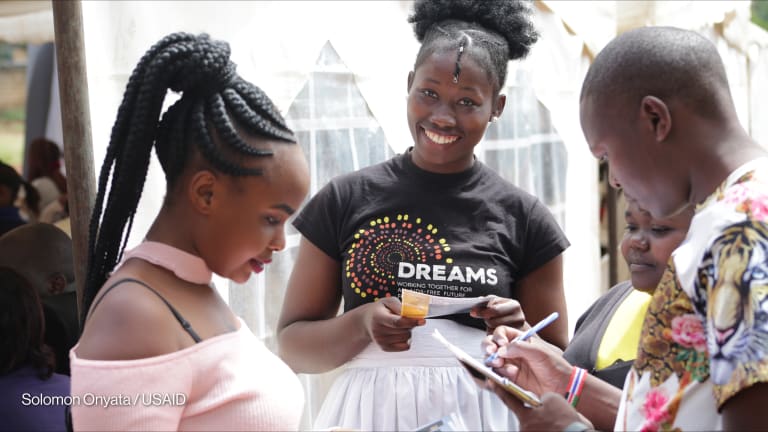
Although no longer taboo, family planning remains an uncomfortable topic of discourse in many developing countries. Some, especially young and unmarried individuals, shy away from seeking information about contraception, even when available, because of the connotations and stigma surrounding it.
A U.S.-based development nongovernmental organization has a solution to that challenge: send information on family planning services through SMS.
The idea behind m4RH — short for Mobile 4 Reproductive Health project — emerged from a 2007 study conducted by FHI 360 on those using family planning methods in East and West Africa. Findings indicated that men and women often chose emergency contraception because they didn’t know any other comparable methods.
“So we started asking these family planning users: ‘What if we gave you information about contraceptive methods on your mobile phone?’ And we heard very positive responses to it,” Kelly L’Engle, principal investigator for m4RH, told Devex. “I remember we had a person in Ghana saying we get sport scores on our mobile phone, we get information about the weather, we get Bible quotes, we should also get family planning information.”
An on-demand service, m4RH is currently available in Kenya and Tanzania. Anyone in those countries with a mobile phone and cell phone reception can access the information by texting m4RH to a short code (4127 in Kenya and 15014 in Tanzania). The user then sees a menu of options to learn more about a full range or contraceptive methods such as IUDs, condoms and birth control pills. The content covers basic information, seeks to address common myths and misconceptions and advises about common side effects of the chosen method.
M4RH also tells users where they can get their contraceptive method of choice. All they need to do is reply 99 and enter the first three letters of their district to receive the location of clinical partners, both public and private.
The project also involves a story-telling component. The service runs a story in installments told from the perspective of a “role model” — a woman or a man considering using contraceptive methods under different scenarios. These examples include a person who is HIV-positive, a woman who decides to head to the city expecting to see her boyfriend more often and a man who is uncomfortable with his girlfriend wanting to use family planning methods.
“We find that people totally like this method of learning about family planning and that it’s very engaging to them,” L’Engle said. “They remember the characters in the story, they have favorite chapters, they remember the situations therein. So there’s probably a higher level of processing and thinking about family planning from reading these stories.”
According to L’Engle, young people in Kenya particularly appreciate m4RH as oftentimes when seeking information on contraception, clinic providers simply advise them to abstain from sex or judge them about their behavior.
About half of m4RH users are men, and there’s evidence that when men are involved and supportive of family planning, women are more likely to use it, L’Engle said.
“When they [men] go into a clinic and ask about family planning, they are often shunned because it’s not seen as a man’s role to know about family planning in many places,” L’Engle noted. “In some places, it’s only the men that determine family planning methods to be used.”
M4RH is currently free to users. But FHI 360 is now considering a business case around the service. The goal is to sustain m4RH, currently funded by the U.S. Agency for International Development, beyond donor funding.
Under the plan, FHI 360 will talk with m4RH users to see if they might be willing to pay a discounted rate for the text messages. It expects to develop a tiered pricing structure where the basic service could be available for free or at a very low cost and users will be charged with a fee for additional services. This particular project is supported by a United Nations Innovation Working Group grant and will focus on Kenya and Tanzania.
The service is heading soon to another country: Rwanda, slated for early 2014.
“M4RH is based on global family planning guidelines,” L’Engle told Devex. “What that means is information in those messages is relevant for almost every country in the world and it only needs a little bit of adaptation at the local level. And so it’s actually something that could be used, could be provided as a service in every country around the world.”
Read our previous #innov8aid and let us know what you think about this innovation by leaving a comment below.
Search for articles
Most Read
- 1
- 2
- 3
- 4
- 5








